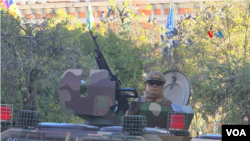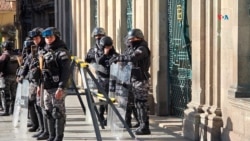A plan to give a coup against Bolivian President Luis Arce was not what General Tomás Peña y Lillo expected when he entered a barracks in La Paz on Wednesday of last week.
The leader of the retired military said he was surprised to receive a call from the head of the army, General Juan José Zúñiga, asking him to come to talk about how to defend the imprisoned soldiers, but since it was a highly anticipated meeting he went to the headquarters of the General Staff.
Upon arriving, he found Zúñiga surrounded by officers who asked him for help in “defending democracy.” Peña y Lillo refused, but the armored vehicles were already leaving the barracks.
“I saw the tanks leaving, everything was already set up… I thought it was a drill or that he was going to give his part to the president. But not a coup,” he said by phone to The Associated Press the soldier, wanted for his participation in the alleged failed attempt, from a location he did not reveal.
Peña y Lillo recalled that “there had been a lot of talk about Arce handing over the government to Zúñiga” amid the recurring social protests over fuel shortages and the economic crisis, but he still maintained that “this seemed like a circus.”
A week after the military uprising, doubts abound about what Peña and Lillo consider “a tragicomedy” and the inhabitants of Bolivia – which has seen no less than 190 coups d’état since its independence in 1825 – have never been so confused.
“This is very strange, very unbelievable,” he told AP Marcia Tiñini, a 58-year-old teacher in downtown La Paz, added: “At first I believed in the government and felt solidarity, but now I don’t know what I can say to them.”
Yesenia Cachi, a 22-year-old student, said instead that she supports Arce because she believes there was a failed coup. “Our vote should be respected, General Zúñiga should be condemned. They wanted to remove our president,” she said.
The day after the uprising, Arce supporters marched in defense of democracy. However, within hours the conversation turned away from Zúñiga’s possible motives and the tensions that led to the failed rebellion to whether or not it had been an attempted coup.
Before being imprisoned, Zúñiga said on national television that it had all been an elaborate deception by President Arce to improve his popularity and divert attention from the economic crisis and the political dispute he has with former President Evo Morales (2006-2019) over who will be the ruling party’s candidate in the 2025 elections. The president has rejected these accusations..
Many bewildered Bolivians were trying to understand the face-to-face meeting between Arce and Zúñiga that was broadcast live on local channels while tanks remained stationed in Plaza Murillo, in front of the government headquarters, and uniformed officers fired tear gas at civilians who had approached the place in defense of the president.
“It was a kind of theater,” said retired general Omar Cordero Balderrama. “It’s the first time I’ve seen a military coup broadcast live on television. With coups, everyone knows that the first thing that is controlled is the media.”
When Zúñiga and several military vehicles withdrew from the square just three hours after the start of the incidents, Arce asserted that “no one can take away from us the democracy that we have won at the polls and in the streets.”
But experts and historians have their doubts.
“Having had my own brief experience as head of state, I can tell you that you cannot take an elevator down 16 floors and chat with the guy who has moved tanks up to the front doors,” said Eduardo Rodríguez Veltzé, a prominent Bolivian judge who served as president from 2005 to 2006.
Many also found it strange that the head of the Armed Forces, Gonzalo Vigabriel Sánchez, was absent. He only appeared at the ceremony in which Arce swore in the new heads of the three forces after ousting the previous ones.
“If it were a coup, the presidency would purge the armed forces,” said Jorge Santiesteban, a Bolivian colonel and military expert. “On the contrary, the president rewarded the commander in chief who did nothing in the face of a major insurrection committed by his subordinate” by keeping him in office.
It was also suspicious that the rebellion was led by Zúñiga, an officer who owed his position to Arce and who days before the alleged coup attempt was seen in photographs on social media playing basketball with the president.
Then Zúñiga’s unproven accusations of an alleged self-coup began to take shape and former President Morales took the opportunity to discredit his rival..
“President Luis Arce deceived and lied to the Bolivian people and the world. It is regrettable that such a sensitive topic as the denunciation of a coup is used. Faced with this reality, I must apologize to the international community for the alarm generated,” he wrote on Sunday on X, formerly Twitter.
In an ironic twist, Argentina’s far-right President Javier Milei agreed with the leftist Morales. Milei’s office issued a harsh statement accusing Arce of fabricating the coup attempt by citing undisclosed intelligence information.
At least 30 people have been arrested in connection with the alleged coup and are accused of armed uprising, according to Bolivian prosecutors. Most are in pretrial detention or under house arrest and face sentences of up to 20 years in prison. Some accused officers said they had no idea what Zúñiga had planned when he ordered them to occupy Plaza Murillo on June 26. Others gave accounts that further fueled conspiracy theories.
Former Air Force commander Gen. Marcelo Zegarra told prosecutors that Zúñiga had the support of three foreign diplomatic missions in La Paz: the United States, part of the European Union and Libya. But the North African country has no diplomatic mission in Bolivia and White House spokeswoman Karine Jean-Pierre denied reports that the United States was involved.
For his part, the Minister of Government, Eduardo Del Castillo, mentioned that he heard versions that some countries had been involved, but clarified that these statements must be corroborated with the ongoing investigation.
Meanwhile, General Peña y Lillo said that during the meeting with Zúñiga he saw on a whiteboard that Israel supported the rebel general. “It is not logical,” he said.
According to Minister Del Castillo, Peña y Lillo was one of the military officers who would form part of the cabinet of a possible de facto government of Zúñiga.
On Thursday, Arce insisted that it was an attempted coup. “It is evident. Anyone who does not see that is aligning themselves with the right,” said the president at a public event.
Connect with the Voice of America! Subscribe to our channels Youtube, WhatsApp and to newsletter. Turn on notifications and follow us on Facebook, X and Instagram.


















Add Comment